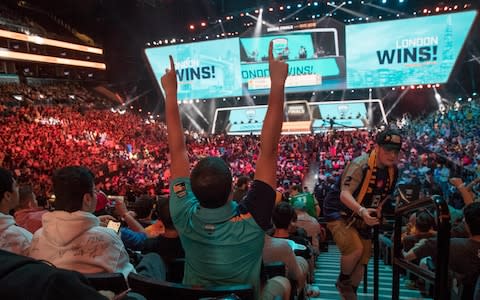Pro gamer punished for supporting Hong Kong protests has prize money restored after international uproar

The video gaming giant Blizzard has partly reversed its punishment of an Esports player who spoke out in support of the Hong Kong protesters after a fierce backlash from fans, politicians and its own employees.
Ng Wai Chung, known as Blitzchung, had been banned from competing in Blizzard's Hearthstone game for one year and stripped of all his winnings after shouting the protest slogan "Liberate Hong Kong! Revolution of our times!" during a live-streamed post-match interview.
But the company, which has "Every Voice Matters" as part of its motto, said on Monday that it would cut Chung's suspension in half and reinstate his winnings following an international uproar which led many players of its games to cancel their subscriptions.
Those fans, as well as former employees and US senators including Marco Rubio and Ron Wyden, accused Blizzard of banning Chung in order to appease the Chinese government, which has taken a hard line against Western companies who support the protesters.
Blizzard has substantial business interests in China, where its flagship games World of Warcraft and Overwatch are beloved by millions of players. Its parent company Activision Blizzard, in which the Chinese tech titan Tencent has a 5pc stake, is reportedly seeking regulatory approval for its Call of Duty mobile game – a legal requirement for all new titles in China.
"The specific views expressed by Blitzchung were not a factor in the decision we made," insisted Blizzard's president J Allen Brack on Monday. "I want to be clear: our relationships in China had no influence on our decision.
"We have these rules to keep the focus on the game and on the tournament to the benefit of a global audience... if this had been the opposing viewpoint delivered in the same divisive and deliberate way, we would have felt and acted the same."

Nevertheless, he said, after consideration, the company had decided that six months was a "more appropriate" punishment and that he should still receive his prize money because his behaviour had taken place outside the game itself.
Responding to the decision, Chung, who lives in Hong Kong and has previously declared that he has "no regrets" about the incident, said he was "grateful" to Blizzard for "reconsidering their position", but urged it to also completely rescind its punishment of two live stream Esports presenters who had hosted the broadcast.
"Earlier this week, I told media that I knew I might have a penalty or consequence for my act, because I understand that my act could take the conversation away from the purpose of the event," he said.
"In the future, I will be more careful on that and express my opinions or show my support to Hong Kong on my personal platforms."
The controversy illustrates the increasing difficulty for Western companies intent on maintaining a balance between the ideals of their audiences at home and the restrictive policies of China's Communist government, which is locked in an economic and ideological confrontation with the USA.
It came on the heels of another dispute between China and the US National Basketball Association (NBA), in which a failure to punish the manager of the Houston Rockets team for a statement supporting the protests led to Chinese state media cancelling the NBA's broadcasts and other Chinese companies boycotting their merchandise.

The jewelry company Tiffany was also forced to drop one of its advertising images, featuring a woman holding a ringed hand over her eye, after, Chinese social media users interpreted it as a reference to common protest gesture paying tribute to a nurse who was almost blinded in one eye by a police beanbag round.
Blizzard's initial decision touched a nerve among video game fans, who began boycotting the game and launched a campaign to reappropriate one of Overwatch's characters, a Chinese woman named Mei, as a symbol of resistance. Some Blizzard employees also staged a walk-out.
An official Hearthstone social media account run by Blizzard's Chinese partner NetEase, which operates Blizzard's online games in China under licence, expressed "strong indignation and condemnation of the events" and promised to "protect our national dignity".
Rival companies have taken differing stances. Riot Games, the creators of League of Legends, ordered its own players to "keep personal views on sensitive issues (political, religious or otherwise) separate" from their conduct in tournaments.
"We have reminded our casters and pro players to refrain from discussing any of these topics on air," he said. "Our decision reflects that we have Riot employees and fans in regions where there has been (or there is risk of) political and social unrest, including places like Hong Kong.
"We believe we have a responsibility to do our best to ensure that statements or actions on our official platforms (intended or not) do not escalate potentially sensitive situations."
By contrast, Epic Games, the makers of Fortnite, declared that it would not ban or punish any players for speaking on the same topics. Epic is even more tangled up with Tencent than Activision Blizzard is, with the Chinese company owning 40pc of its shares, but its chief executive Tim Sweeney remains the controlling shareholder.


